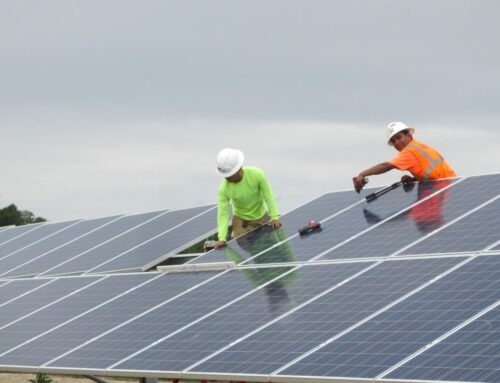Federal coal push could slow US emissions reduction progress
September 22, 2025
A recent federal policy shift toward the increased use of fossil fuels, including coal, and away from renewable sources of power, could have implications for recent declines in emissions in the U.S., particularly as Congress works to codify many of the new energy priorities of the Trump administration.
An analysis released last week by the Energy Information Administration showed a reduction in carbon dioxide emissions across the U.S. since 2005, driven primarily by the decreasing use of coal across the electric power sector. From 2005 to 2023, EIA said, per capita emissions fell in every U.S. state and energy-related emissions decreased 20 percent nationwide.
But EIA reported in late July that coal’s decline would “temporarily reverse” in 2025 because of “rising electricity demand and coal’s increasing competitiveness in the electric power sector,” which accounts for most coal’s use across the country. Partly as a result of increased use of fossil fuels, EIA said in its short-term outlook, the U.S. is forecast to experience a 1 percent increase in total emissions this year.
Coal is the most carbon-intensive fossil fuel, releasing more CO2 emissions when burned than any other form of fuel, including oil and gas. Previous efforts to limit U.S. emissions have placed harsh restrictions on the coal industry in the name of reducing the nation’s contributions to global warming.
The House voted last week to permanently reauthorize the National Coal Council, which the Energy Department had restarted in June. The council advises DOE on matters related to the coal industry, including federal policy concerns, technology and research.
“For decades, the National Coal Council was a powerful voice for coal and a tireless champion for American workers and communities,” Rep. Michael Rulli, R-Ohio, who introduced the bill, said in a statement. “Coal has reliably fueled our factories, powered our homes, and helped build the greatest economy the world has ever known — it’s ridiculous to neglect it.”
If the bill becomes law, it would not only codify the administration’s move to re-assemble the advisory committee, but also excuse it from a sunset clause in the Federal Advisory Committee Act.
“We need common-sense, energy policies that keep coal in the mix, strengthen our grid, and protect good-paying jobs,” Rulli said. “Codifying the National Coal Council into law ensures that politics doesn’t get in the way of good policy.”
The bill’s House passage, on a 217-209 party-line vote, was the latest signal that congressional Republicans intend to bolster President Donald Trump’s effort to reinvigorate the coal industry. Over the last eight months, the administration has also expanded mine operations across the West to allow increased access to coal on federal lands and enabled some coal-fired power plants to stay open past their scheduled retirement.
Republicans generally have celebrated the broad shift away from renewable energy sources such as wind and solar — which the administration has called “unreliable” — and toward increased production of fossil fuels as part of the effort to establish so-called energy dominance.
“Republicans are delivering on our promise to strengthen the grid, create American jobs, and lower energy costs for American families,” Speaker Mike Johnson, R-La., said after the House passed the National Coal Council bill and two others related to energy issues. “This week, House Republicans passed three pieces of key legislation to build on the energy provisions within the historic Working Families Tax Cuts and codify President Trump’s Executive Orders to unleash American energy.”
Congressional Democrats have expressed frustration that the federal government is turning away from renewable sources of energy in its growing preference for fossil fuels.
“This week, House Republicans continued their assault on affordable, homegrown clean energy, passing a slate of bills that double down on dirty, expensive fossil fuels,” the House Sustainable Energy and Environment Coalition, a group made up of Democrats, said in a statement. “Instead of tackling the cost-of-living crisis, Republicans seem intent to live in the past, trying to resurrect abandoned pipeline projects and bringing back the ‘golden age’ of coal mining.”
“Far from energy dominance, propping up dirty and expensive coal, rewriting pipeline policies to pump more foreign oil into America, and hamstringing the most affordable sources of energy in our nation is a one-way road to irrelevance,” the members said.
But the administration says increasing the use of fossil fuels, including coal, is a necessary response to growing electricity demand, explaining that its efforts in the energy sector will consequently prioritize sources that offer more dense baseload power.
Additional federal policy changes have more explicitly targeted regulations aimed at emissions’ reduction — perhaps most notably, the EPA’s proposed rescission of the 2009 endangerment finding, which would, if finalized, remove the agency’s authority to regulate greenhouse gases. Public comment on that proposal ends Monday.
Search
RECENT PRESS RELEASES
Related Post



